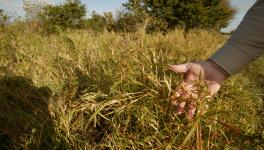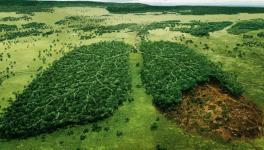Nature in Most Perilous State Ever, Says IPBES Global Assessment Report

Image Courtesy : theconversation.com
“What is at stake here is a liveable world,” says Robert Watson, who chaired the landmark assessment done by Intergovernmental Science-Policy Platform on Biodiversity and Ecosystem Services (IBPES) on the state of global biodiversity and ecosystems. What worries Watson is the finding which says that nature is in the most perilous point in human history and its decline is accelerating.
The way out, according to the report, is that transformative changes to economic, political and social systems have to be adopted by the world’s nations. Only then the agreed global targets for nature conservation could be met up. Alexandre Antonelli, director of the Royal Botanic Gardens, UK, said in a statement, “The report confirms that we can’t just preserve, we must reverse the trend by increasing biodiversity locally, regionally and globally”.
The Assessment Report
The massive report, was approved at the 7th session of the IPBES Plenary, meeting last week (29 April -- 4 May) in Paris. The IBPES which is based in Bonn, Germany includes representatives from more than 100 countries, and more than 450 experts from around the world were involved in drafting the 1,800 page report which took 3 years for completion.
The team preparing the assessment reviewed some 15,000 scientific papers and also researched other sources of data on trends in biodiversity and its ability to provide people everything from food and fibre to clean water and air—that is the ecosystem services.
The report notes that out of 8 million known species of animals and plants, almost 1 million are under threat of getting extinct and this includes more than 40% of amphibian species and almost a third of marine mammals.
Since 1900, native species have, on an average, become about 20% less abundant. The extent and conditions of natural ecosystems have declined 47% since the earliest estimates and many of these are deteriorating at an alarming rate of 4% every decade.
The other metrics of decline of nature that have been highlighted in the report are:
-
Human activities have severely altered 75% of the lands.
-
Between 1980 and 2000, over one hundred million hectares of tropical forest have been destroyed.
-
Crops and livestock demand 75% of freshwater and more than a third of land.
-
Wetlands are being destroyed at a rate that is three times faster than the forests.
-
Pollution caused by plastic has increased 10 folds since 1980, and more alarmingly, 300 million to 400 million tons of industrial wastes are being dumped every year.
Causes of Damage
The report, for the first time at a global scale has ranked the causes of damage. Changes in land use, principally agriculture, which have destroyed habitat, tops the list. Coming down to the second position, hunting and other kinds of exploitations have also caused major destruction, followed by climate change, pollution, invasive species that are spread by trade and other activities. Climate change, according to the authors, would overtake the other threats in the coming decades.
The report includes activities of indigenous and local communities. It says that, importantly, lands managed by indigenous people are declining less quickly than elsewhere.
This new report is the first global assessment of the state of nature since the Millennium Ecosystem Assessment in 2005. Experts in ecosystem and biodiversity hope that the new report would be more impactful as the report involves governments of different countries and the report was asked for by these governments.
The report warns that it is the transformative measures that could start reversing the scenario. The transformative changes would involve a wide array of activities that include land restoration, preventing soil erosion, widely enforced limits on fishing, etc. In a nutshell, reversing the trend would require a shift to a more sustainable global economy.
The report also sees a pushback in promoting such transformative changes, as those having vested interests in the status quo would oppose in initiating any such measures. To tackle this, IPBES plans to examine the ways to achieve such transformative changes in its next round of work.
Get the latest reports & analysis with people's perspective on Protests, movements & deep analytical videos, discussions of the current affairs in your Telegram app. Subscribe to NewsClick's Telegram channel & get Real-Time updates on stories, as they get published on our website.




















